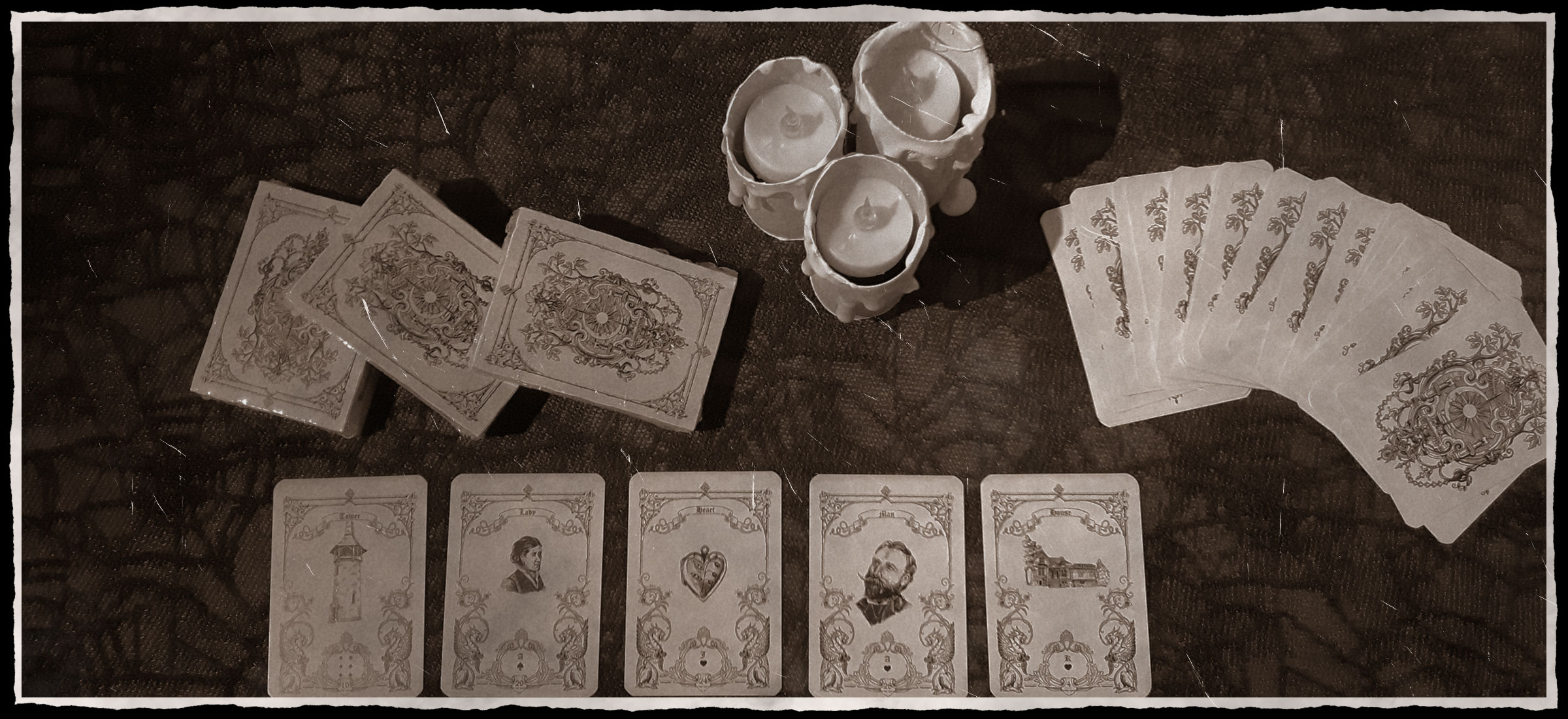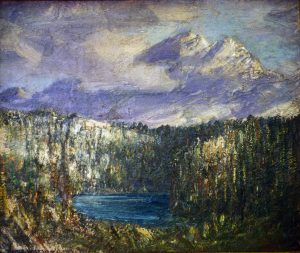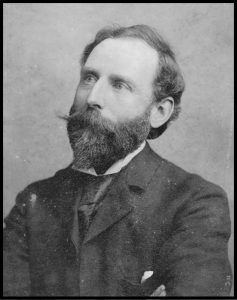HOMER WATSON LENORMAND CARDS
History of the Lenormand Deck
The Leonormand deck is a fortune telling deck inspired by the French seer Marie Anne Lenormand. Lenormand was born in Alençon, Normandy in 1772. Frightened by her fortune telling abilities, her parents sent her to live in an orphanage. At the age of 16, she opened a fortune telling salon. She acquired a deck of cards which she began to use in her fortune telling to great success. She was considered one of the greatest cartomancers of her time. After her death her name was used on several cartomancy decks including a deck of 36 illustrated cards known as the Petit Lenormand or simply Lenormand cards. The 36 card Lenormand deck is modelled on a deck of cards published ca.1799 as part of Das Spiel der Hoffnung (The Game of Hope), a game of chance designed by Johann Kaspar Hechtel of Nuremberg.
Lenormand cards differ from Tarot cards and ruins as they have more simple images and less hidden interpretation or symbolism. Instead of focusing on the “why” they focus on the “how”. For this reason they are favoured both by professionals and amateurs.
How to ask questions
When using a Lenormand deck, it is important to ask clear and concise questions, however they should not simply be yes or no questions. It may be helpful to write your question on paper and read it aloud. Questions may include clarification of how events have occurred, understanding potential outcomes of a situation or how to achieve a goal. It is best to frame questions in a positive manner (don’t ask “why not” instead ask “how can I achieve”). It is also important to not ask the same question multiple times trying to gain a different response.
Card meanings
CLOVER
Luck, happiness, fate’s gift, Lightheartedness, Opportunity, Being Untroubled, Comedy
The clover represents a happy coincidence, or opportunity. It generally represents something with a small impact rather than having major significance in your life. As such, it usually represents a passing moment that may involve you to take advantage before it passes.
HOUSE
Home, Establishment, Safety, Tradition, Custom, Privacy, Conservation
The house represents family and home life. It can represent the building itself, the people within it or a more abstract concept of “home” where one feels safe or comfortable. The house can also represent a barrier or a sense of close-mindedness.
TREE
growth, grounded, past connection, personal growth, spirituality, health
The tree represents growth and maturity as well as a clear mind and the ability to rationalize a situation. It can also represent health and wellbeing in both a physical and spiritualist sense.
CLOUDS
Confusion, Doubt, Unclarity, Misunderstanding, Hidden Secrets, Insecurity
As clouds block out the sun, the clouds card represents that which is hidden. It indicates doubt and confusion that may be the result of a lack of clarity. It may warn of troubles that you might like to avoid.
SNAKE
Desire, Seduction, Deception, Craving, Attraction, Sexuality, Wisdom, Forbidden Knowledge, Envy, Rivalry
The snake is a very old symbol with many different meanings. The card can be a warning that there may be an untrustworthy person around you. It can also represent desire and craving, both healthy and unhealthy. Lastly, the snake may also represent knowledge and wisdom, in interpretations where morality is not attached to this symbol, knowledge and wisdom are positive and revered, however the snake can also represent forbidden knowledge.
COFFIN
Ending, Dying, Funeral, Loss, Grief, Mourning, Sadness
The coffin card generally has negative meaning; indicating major issues, illness or even death. It can also represent the more literal aspects such as loss, suffering and burying, when something is buried away so deep that we can no longer access it.
BIRDS
Worry, Excitement, Gossip, Chattering, Nervousness, Anxiety, Conversations, Training, Communication
The birds represent communication in all forms, this may be both positive and negative in interpretation. On the negative end it could involve gossip, worry and anxiety but it may also represent neutral situations such as conversations or training.
CHILD
New Beginnings, Child, Toddler, Play, Inexperience, Innocence, Immaturity
The child may represent a new path with many options. It may indicate naivety and inexperience indicating that a more experienced person should be relied on.
BEAR
Power, Leadership, Dominance, Influence, Short temper, Strength of character, Generosity, responsibility
The bear represents strength and power. On the positive end this may be perseverance, a nurturing and generous leader or strength of character. On the negative side this could be someone who asserts too much power, is short tempered or aggressive.
DOG
Loyalty, Friendship, A Follower, Devotion, Obedience, Support
The dog represents a strong companion or friend. This is a supporter or sense of comfort or be an obedient follower. Generally positive, the card can also indicate someone who is too much of a follower and unable to make decisions on their own.
TOWER
Authority, Protection, Permanence, Solitude, Loneliness, Isolation, Institutions, Stability, Arrogance
The tower represents stability and permanence on the positive end but loneliness and isolation on the negative end. Due to its stature, it may also represent institutions such as large organizations or government.

The tower is visible on the Grand River near Homer Watson House & Gallery. It was constructed in 1926 as a memorial to the pioneers who first settled the area. Homer Watson memorialized it in his painting “Ice Jam at Doon.”

GARDEN
Public Affairs, Society, Culture, Teamwork, Fame, Social Networks, holiday, illusions
The garden represents public activities or activities outside the house. It may represent the release of information into the community or an announcement or recreational activity.
Homer Watson and his wife Roxanna were not avid gardeners, but Homer’s sister Phoebe was. Phoebe moved into Homer’s house after Roxa’s death and developed the gardens on the property. One of the most unique features she added was the palette garden, which mimicked her brother’s artist palette in shape and was filled with flowers in many splashes of colour.
MOUNTAIN
Difficulties, Problems, Obstacles, Impairment, Hurdles, Struggles, Challenge
The mountain represents a barrier to an outcome. It could be a person, event or additional work.
CROSSROADS
Choices, Many Opportunities, Travel, Separation, Hesitation, Decisions
The crossroads indicates a significant or event fateful choice. The proximity of negative may indicate doubt or wrong decisions. It can also demonstrate the need to make a firm decision.
Homer Watson experienced reaching a crossroads at many points during his life. As a youth, he was conflicted whether he should continue the family trade working in a mill or pursue a more precarious career as an artist. Later he was conflicted about whether he should stay in Europe to continue in the European art world or return to his beloved hometown of Doon (now Kitchener), Ontario.
HEART
Love, Amicability, Romanticization, Forgiveness, Reconciliation, Softness, Charity
The Heart represents love in many forms. Sometimes it can represent romantic love, but it can also represent affection, heartfelt connection and compassion for other beings. In combination with negative cards, it can represent the breakdown of relations or heartlessness.
Homer Watson first gained success in the international art world when he sold his painting “Pioneer Mill” to the Marquess of Lorne as a gift for Queen Victoria. The sale earned him $300, which he used to purchase a gold watch for himself, a gold chain for his wife and a locket with faux rubies and pearls for his sister, Phoebe. This card is inspired by the locket, although its shape is unknown.
BOOK
Secrets, Knowledge, Education, Information, Research, Studies
The book represents knowledge, education and learning. It is also associated sometimes with secrets and truth – things that can be discovered with the aid of knowledge.
Homer Watson wrote an untitled manuscript for a book he intended to publish. The book was inspired by his own life but unfortunately was never completed or published. The manuscript is now part of the collection at Queens University Archives.
MAN
Male in Querent’s Life (Male Friend, Partner, Family Member), If the Querent is Male, the Querent
The man card can represent a specific male or masculine character or masculinity in general. It may also represent behaviours that are stereotypically masculine. This card should be interpreted considering its surrounding cards.
This card depicts Homer Watson, the first internationally celebrated Canadian landscape painter. With virtually no formal training, Homer Watson gained international acclaim when his painting “Pioneer Mill” was purchased by the Marquess of Lorne as a gift for Queen Victoria. He would become known as the first Canadian artist to depict Canada as it truly was rather than through the lens of the European art world.
LADY
Female in Querent’s Life (Female Friend, Partner, Family Member), A Female Querent, Femininity
The woman card represents femininity and all things typically associated with women. It may represent a specific woman or simply refer to feminine traits or behaviours.
MOON
Subconscious, Intuition, Emotions, Fears, Desires, Fantasy
The moon represents the subconscious, coming out when you are in a dream state. In the night, things become less clear, and you must rely on your intuition.
CROSS
Duty, Conviction, Suffering, Burden, Intolerance, Principles, Indoctrination
The cross can represent religion or responsibility. It may also represent some of the more negative aspects of ideologies, including intolerance and indoctrination.
Homer Watson’s mother was a strict Christadelphian. In his youth, Homer was not fond of his mother’s religion but explored the scriptures in the Bible later in life. He sought to use the scriptures to justify and support his spiritual beliefs.

























































